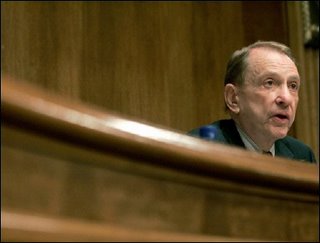 Lost amidst the controversies over President Bush's NSA surveillance program, changes to the USA PATRIOT Act, and the SWIFT financial tracking program has been something even more fundamental to combating Islamist terrorists: the dismissal of key military personnel because of their sexual orientation.
Lost amidst the controversies over President Bush's NSA surveillance program, changes to the USA PATRIOT Act, and the SWIFT financial tracking program has been something even more fundamental to combating Islamist terrorists: the dismissal of key military personnel because of their sexual orientation.During the campaign for his first term as President, Bill Clinton promised to permit all citizens to serve openly in the military, without regard to sexual orientation. Meeting stiff resistance from social conservatives, Clinton’s Chairman of the Joint Chiefs of Staff, Colin Powell, crafted a compromise policy that has become known as “Don’t Ask, Don’t Tell” (DADT). Under DADT, military recruiters are prohibited from asking recruits about their sexual orientation and will not investigate the sexual orientation of service people without strong evidence. Homosexual servicemen and women are required to abstain from homosexual sex and may not declare their sexual orientation.
Since September 11, 2001, it has become clear that one of the biggest problems for U.S. intelligence has been a dearth of Arabic- and Persian-speakers in the ranks of the military. Although they are notoriously difficult to recruit, under DADT, the armed forces have also dismissed serving Arabic- and Persian-speakers because of their sexual orientation. Most recently, Bleu Copas, a 30-year-old Arabic linguist who enlisted after 9/11, was dismissed because he is a homosexual, apparently as the result of an eMail campaign from an unknown accuser, and despite the fact that Copas did not acknowledge his sexual orientation during his service.
There are potentially valid reasons to be concerned about the service of openly gay men and women in the U.S. military, but they are based on prevailing culture and potential discrimination against those individuals rather than any inability to serve or any lack of love for country. All of this is, nonetheless, beside the point.
Clearly, homosexuals have served, and continue to serve in the armed forces of the United States, not to mention in those of other nations. Clearly, also, there is a need for Arabic and Persian linguists in our current foreign policy environment. Although I personally believe that there is nothing inherently damaging about the open service of gays and lesbians in the military – it certainly worked for the ancient Greeks – even if it is, the current policy does nothing but shoot American efforts to protect itself from Arabic- and Persian-speaking enemies directly in the foot.
Even if men and women are still to be dismissed from service for being homosexual, surely this can be done on an individual basis, rather than as blanket policy. Don’t Ask, Don’t Tell hamstrings the ability of commanders to evaluate the merits of individual situations and to retain key personnel.
According to a 2005 report by the Government Accountability Office (GAO), more than 9,400 service members were dismissed under DADT through 2004. While that is only a tiny fraction of the total number dismissed for all reasons since 1993, it’s worth noting that more than 750 of the dismissed gay and lesbian service people had critical abilities, including over 300 with crucial language skills. Worse, the Center for the Study of Sexual Minorities in the Military at the University of California, Santa Barbara estimates the cost of discharging and replacing those personnel to have been nearly $369 million!
Don’t we have more important ways to spend taxpayer dollars? Isn't making sure that the military has the language skills it so desperately needs more important than whether a translator is gay? Even if open service for homosexuals remains discouraged, it is time to repeal Don’t Ask, Don’t Tell. Both the American spirit of equality and pragmatism in the face of current realities demand it.




